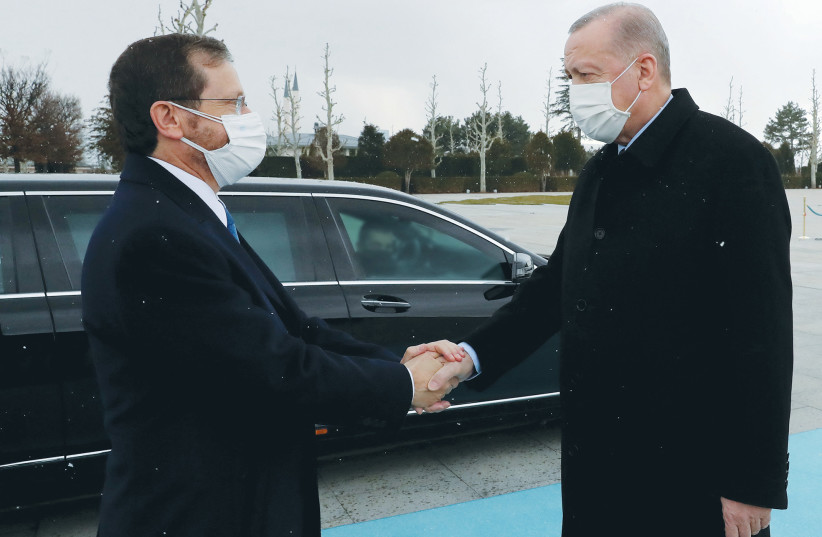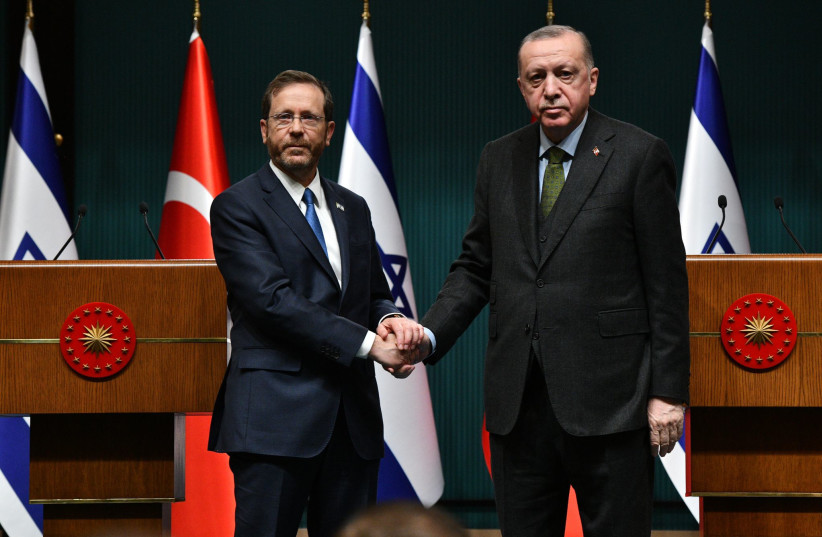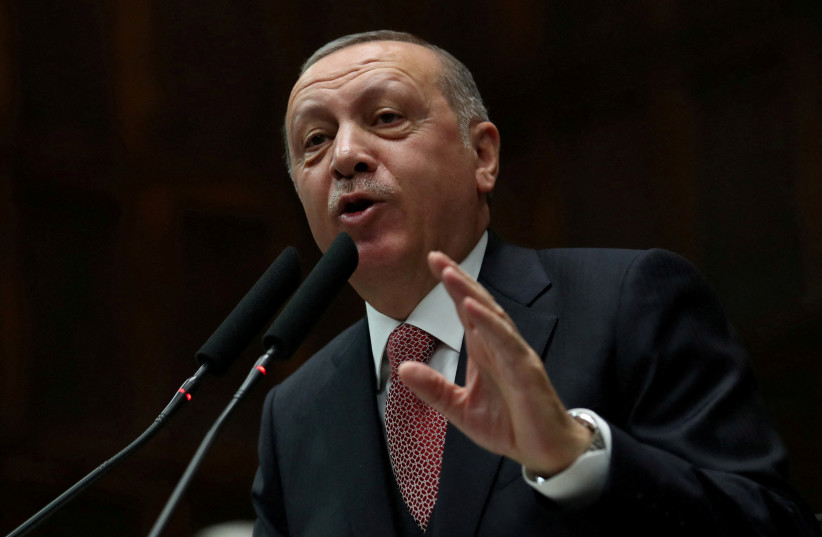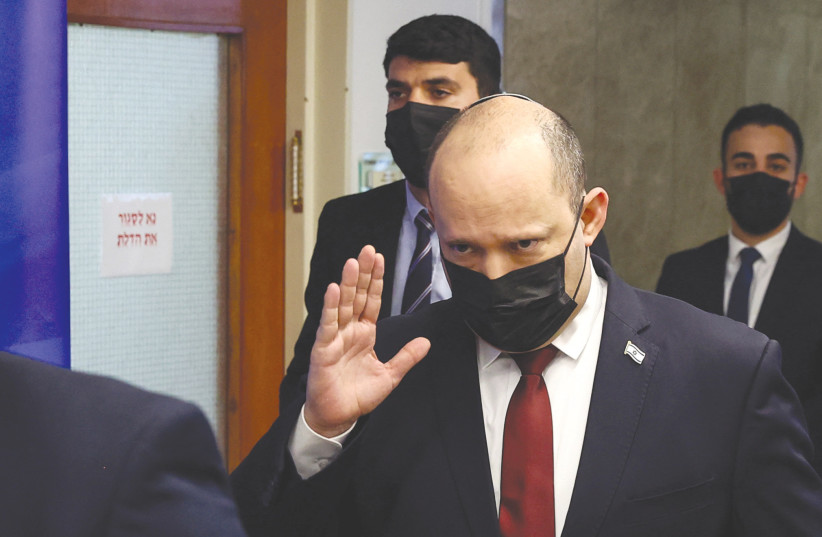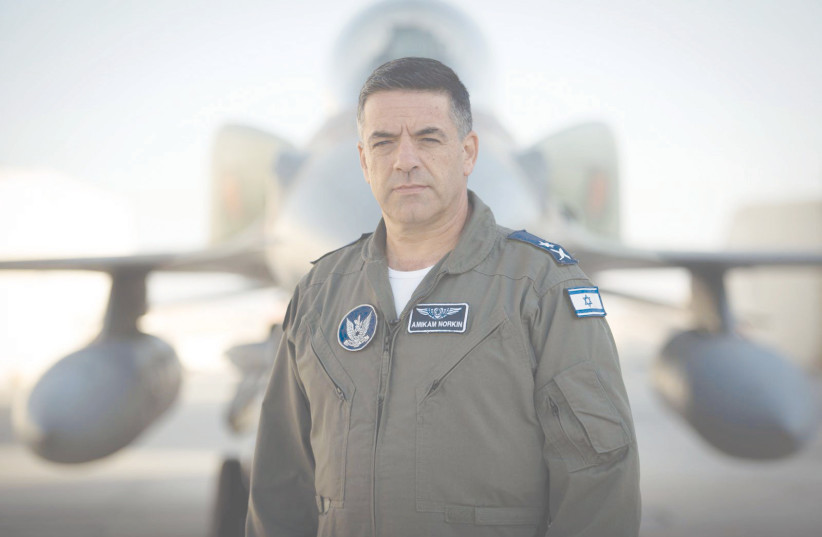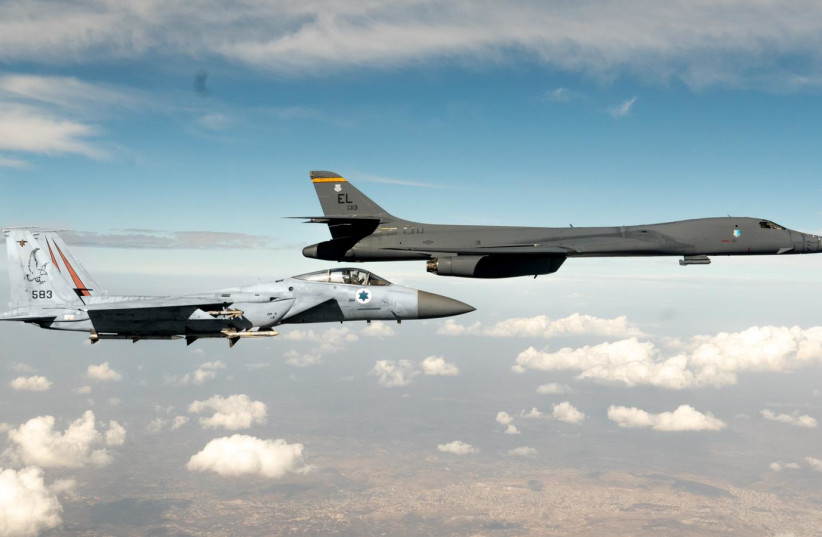 Aggression
by Turkey's military appears to be on the rise in Cyprus -- in areas it
does not yet occupy. According to the Cypriot media, on February 8,
Turkish soldiers approached Greek Cypriot farmers working in fields near
the village of Denia in the United Nations "Buffer Zone," and
threatened to kill them if they did not leave. Pictured: Turkish Army
soldiers and tanks on parade in Nicosia, in Turkish-occupied northern
Cyprus, on July 20, 2021. (Photo by Iakovos Hatzistavrou/AFP via Getty
Images) |
Aggression by Turkey's military appears to be on the rise in Cyprus -- in areas it does not yet occupy. According to the Cypriot media,
on February 8, Turkish soldiers approached Greek Cypriot farmers
working in fields near the village of Denia in the United Nations
"Buffer Zone," and threatened to kill them if they did not leave.
The Turkish soldiers threatened the Greek Cypriot farmers about ten days after Turkey "slammed" the UN for extending its Cyprus peacekeeping mandate.
When the UN Security Council approved
a six-month extension of the UN Peacekeeping Force in Cyprus (UNFICYP)
on January 27, 2022, the government of Turkey was not pleased. They condemned
the UN decision on the grounds that the UN had not received "the
consent of the Turkish Republic of Northern Cyprus (TRNC)", an illegal
entity recognized only by Turkey.
"Reiterating that Turkey supported the TRNC's condemnation of the
U.N. resolution on the extension, the statement said that Ankara will
fully back the steps the [TRNC] administration chooses to take in this
regard," the Turkish newspaper Daily Sabah reported.
To accompany its news report, Daily Sabah published an aerial photo
of the "flag" of the TRNC next to a quote by the founder of Turkey,
Mustafa Kemal Ataturk that reads (in Turkish): "Happy is the one who
says 'I am a Turk'". The "flag" had been painted on the Kyrenia mountain
range, north of Nicosia, in Turkish-occupied northern Cyprus.
The Turkish presence in Cyprus dates back to 1570: Ottoman troops
invaded and plundered the island. Thousands were murdered, many churches
were converted into mosques, and some Muslims from Anatolia were
transplanted to Cyprus. In 1878, Britain assumed administration of
Cyprus; in 1914, it annexed Cyprus, which became an independent republic
in 1960. Britain, Greece and Turkey became guarantors of the
constitution and territorial integrity of the Republic of Cyprus under the 1960 "Treaty of Alliance". Fourteen years later, however, Turkey would violate the treaty and commit an ethnic cleansing there.
So, how did that "Turkish flag" end up on the Kyrenia mountain range?
Noted for its historic harbor and castle, Kyrenia is a Greek Cypriot
city built by the ancient Greeks, who were named Achaeans. Since the
1974 Turkish invasion, however, Kyrenia has been under unlawful Turkish
occupation and the city's population consists now almost completely of
illegal settlers from Turkey, who were allocated properties stolen from
Greek Cypriots. The city -- like the rest of the Turkish-occupied part
of Cyprus -- is now controlled by the TRNC, which is not recognized by
international law.
Turkey's massive military invasion against Cyprus in 1974 was
purportedly meant to restore constitutional order after a Greek coup,
which lasted for less than a week. Turkey's actions, on the other hand,
indicated that their goal had actually been ethnic cleansing and
colonization. Until the 1974 invasion, the northern part of Cyprus -
like the rest of the island – had been majority-Greek. The Turkish
invasion forcibly changed that. Today, more than 40,000 Turkish troops
are illegally stationed in the occupied area. The indigenous Greek
Cypriot residents have never been allowed to return and reclaim their
homes and lands.
The democratically-elected mayoral officials of Kyrenia, who had to leave the city after the invasion, wrote:
"The Turkish invasion of July 20th 1974
destroys everything. The Greek residents of Kyrenia, terrified by the
gunfire of the Turkish air force, scatter and seek shelter in basements.
Three days after the invasion a cease fire agreement is achieved, but
the Turkish troops violate it, invade and loot the city while many
citizens are slaughtered. Most of the Kyrenians who choose to stay find
themselves trapped and are transferred to the Dome hotel from where the
Turks force them to gradually abandon the city along with the rest of
the Greeks in the district."
The Turkish invasion, launched on July 20, 1974, was reported by The New York Times, which noted that that Turkish forces started bombing northern part of Cyprus indiscriminately:
"Striking at dawn, Turkish troops borne by transport
ships and assault boats stormed ashore on the north coast near Kyrenia
and on the south coast near Limassol. Simultaneously, hundreds of
paratroopers dropped into the capital of Nicosia.
"Turkish jets bombed and strafed a variety of targets, including the
Nicosia airport, a Greek Army encampment and other garrisons. Turkish
Warships, meantime, pounded Greek‐Cypriot/shore installations on both
coasts...
"A pooled dispatch said that Turkish fighter‐bombers had struck a
mental hospital in Nicosia, killing at least 20 persons and wounding
60."
The next day, the New York Times continued:
"The air and sea invasion yesterday devastated the resort
strip of tourist hotels on the north coast of Cyprus. Greek Cypriots
and foreigners huddled under mattresses in the cellars of ruined
buildings.
"Turkish warships shelled the northern port of Kyrenia and smaller
communities to the west as American‐made A4 Skyhawks of the Turkish Air
Force bombed roads, bridges, hotels and other buildings.
"The shelling and bombing seemed indiscriminate, with no regard for civilian areas or casualties."
On July 28, 1974, according to the New York Times:
"The reporters said that for many people being held by
the Turks at the Kyrenia's Dome Hotel there was 'confusion, despair and
terror.'
"One correspondent related the tale of one tourist, Margaret
Gavrielides, a British citizen, who with her son Andreas was being held
in the Dome Hotel .
"The Gavrielides family... crawled under beds. They heard an artillery shell explode in the backyard, and then voices.
"Mr. Gavrielides went to the door. A Turkish soldier fired, according to his wife.
"Her husband was taken to a medical station. She has not heard of or
from him, since that day a week ago. The Turkish soldiers separated the
men and threatened to rape the women, Mrs. Gavrielides said.
"But back in Ankara today, the newspapers were full of photos of
smiling Turkish troops clustered in front of tanks draped with the star
and crescent flag, holding their weapons high, and of Greek Cypriot
hostages being given water by Turkish soldiers."
The Turkish military campaign was accompanied
by murders, unlawful detention of both soldiers and civilians in what
amounted to concentration camps, systematic execution of civilians, as
well as the torture and mistreatment (including systematic rapes) of
Greek Cypriots. These crimes were documented
by the two volumes of a historic report by the then European Commission
of Human Rights, adopted in 1976, initially covered up, but then leaked
to the British Sunday Times in 1977 and eventually declassified in 1979.
On August 6, 1974, the New York Times reported:
"Greek Cypriots from small villages around Kyrenia told
stories today of murder, rape and looting by the Turkish Army after its
invasion of Cyprus. The villagers are among 20,000 civilians driven from
their homes by the Turks along the northern coast of the island.
"One ashen-faced man told tearfully how his wife and two young
children were shot before his eyes by Turkish soldiers who rounded up
villagers before shooting them. A married woman whose husband was shot
by the Turks and young girl who saw her fiancé shot told how they were
then raped at gunpoint by Turkish soldiers...
"Eleni Andrea Mateidou, 28, who was married with two children, told
of another mass shooting of able-bodied men at her village, Trimithi.
Her husband Andreas, 27, and father-in-law were among them. Later she
was among village women raped at gunpoint by the Turkish soldiers, she
alleged. 'We went out with our hands raised but the Turks started
beating us,' she said. 'They took off the top clothes of my husband and
father-in-law and led them to the river bed in the village. Then they
were shot. The women of the village were taken to the house of a British
woman who had been evacuated. They were there raped at gunpoint.'
"'At one point another soldier came up with a baby in his arms. He
asked who the mother was. I thought if I said it was mine it might save
me. However, when I said I was the mother he threw it to the ground.'"
Despite the collapse of the coups in Greece and Cyprus by July 23,
1974, restoration of the legitimate government of Cyprus, and a
ceasefire agreement, Turkey launched a second invasion of Cyprus three
weeks later, on August 14, 1974. This time, Turkey gave no pretext but
its second military campaign was even more violent, terrorizing more
Greek Cypriot natives into fleeing their homes and lands. Those two
invasions resulted in the Turkish occupation of 36% of the territory of
Cyprus and 57% of its coastline.
On August 15, the New York Times reported:
"Turkish forces, which began a heavy air and ground
attack early yesterday, appeared today to be on their way toward seizing
control of much of northern Cyprus... A strong air strife [sic] on Nicosia sent thousands of Greek Cypriots fleeing southward.
"A psychiatric hospital close by a Greek Cypriot camp was hit for a
second time in less than a month. Three bombs struck outbuildings,
injuring 36 patients and 3 staff members. In the previous attack, a
direct hit on a ward killed 27 patients and wounded nearly 100."
Despo Marango, a 17-year old from the village of Ashia in the
Famagusta District, fled in her father's truck after Turkish tanks
entered the town. "We took 20 people on the truck including old women,"
she recounted. "The Turkish troops came and fired on us and hurt four people. The Turks came into our homes and stole things."
On August 17, 1974, the New York Times wrote:
"Turkey's invasion forces completed the division of
Cyprus into two areas yesterday and declared a ceasefire... on the 14th
anniversary of the independence of Cyprus from Britain."
To this day, approximately 170,000 Greek Cypriot refugees are still
denied by Turkey their right to return home. Over 160,000 illegal
settlers or colonists have been transferred to the occupied area by
Turkey (the exact number of the illegal settlers is not known; Turkey
has not revealed the data). More than a thousand persons in Cyprus are
still listed as missing.
Meanwhile, the ancient culture and history of the occupied north are being wiped out to perpetrate the myth that the area is Turkish. Geographical names have been Turkified and many Christian churches and monasteries have been destroyed or used for sacrilegious purposes.
The Archangelos Michael Church, built in Kyrenia in 1860, was
converted into "an icon museum" in 1990 after its congregants had fled
the invading Turkish soldiers in 1974. According to a 1994 report, icons were "stolen from the church". According to a 2021 news report:
"The church, which was closed for renovation years ago
due to the crookedness of its minaret [tower], is kept in ruins despite
the completion of the renovation. A shopkeeper said: 'Since the minaret
of the icon museum was crooked, it was considered dangerous so the
minaret was rebuilt. It took several years to build. They built it, and
it has been 6-7 years since it's finished, but it [the museum/former
church] is still waiting in ruins.'"
Currently, Turkey appears to be targeting
the rest of the Republic of Cyprus, a member of the European Union. The
government of Cyprus is now dealing with an "illegal immigration
crisis" which it says Turkey is orchestrating. Government authorities state
that the majority of migrants entering the free part of Cyprus are
being smuggled illegally through the Turkish-occupied northern Cyprus.
The Cypriot government added
that Cyprus was facing "significant demographic change", "ghettoisation
in urban areas" and "acute socio-economic effects" as a result of the
illegal migrant crisis.
Meanwhile, according to Turkish media, Turkey is planning to construct a military naval base in the Karpasia Peninsula in the Turkish-occupied north.
Despite the uncountable war crimes Turkey has committed in Cyprus, the Turkish government has condemned the UN for having its "peacekeeping forces" there.
Turkey has also refused to comply with its obligations under the UN resolutions
concerning Cyprus and many international conventions it has signed. In
2018, for instance, in response to a ruling by the European Court of
Human Rights (ECHR) demanding the release of Selahattin Demirtaş, former
co-chair of Turkey's pro-Kurdish Peoples' Democratic Party, Turkey's
President Recep Tayyip Erdoğan, said: "ECHR's rulings are not binding on us."
The West, however, remains silent -- not merely empowering Turkey to
commit further atrocities but rewarding it. The US recently killed, at
Turkey's request, the EastMed natural gas pipeline project, which would
have transported gas from US allies Israel and Cyprus, via Greece, to
Western Europe. The EastMed pipeline would have been particularly
important in light of Russia's ability, with the Nord Stream and other
pipelines, to blackmail the continent in winter by cutting off much of
its gas supplies.
Turkey will now be able to continue its crimes against the Yazidis in Iraq, the Kurds in Syria and the Armenians in Nagorno-Karabakh with no repercussions.
Philip Christopher, president of the International Coordinating Committee - Justice for Cyprus, wrote:
" Turkey's occupation of Cyprus has now become the first modern
Islamist fundamentalist attempt to capture Western world territory and
resources."
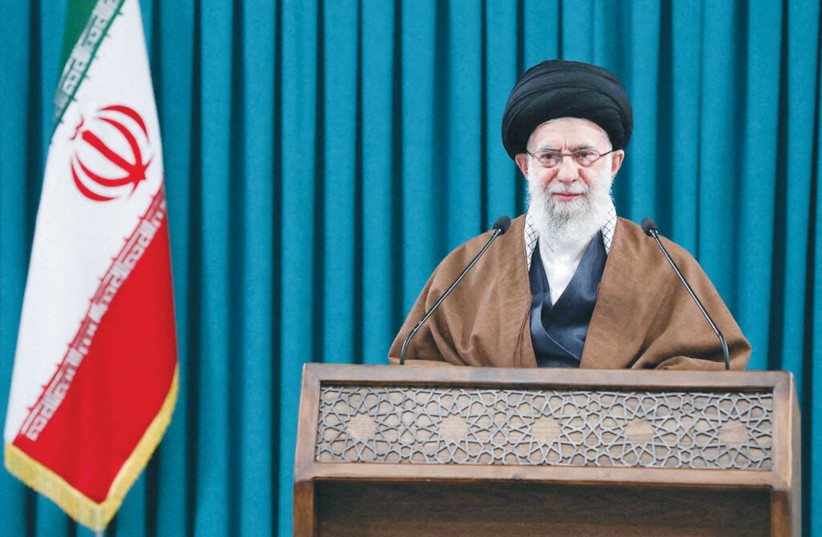
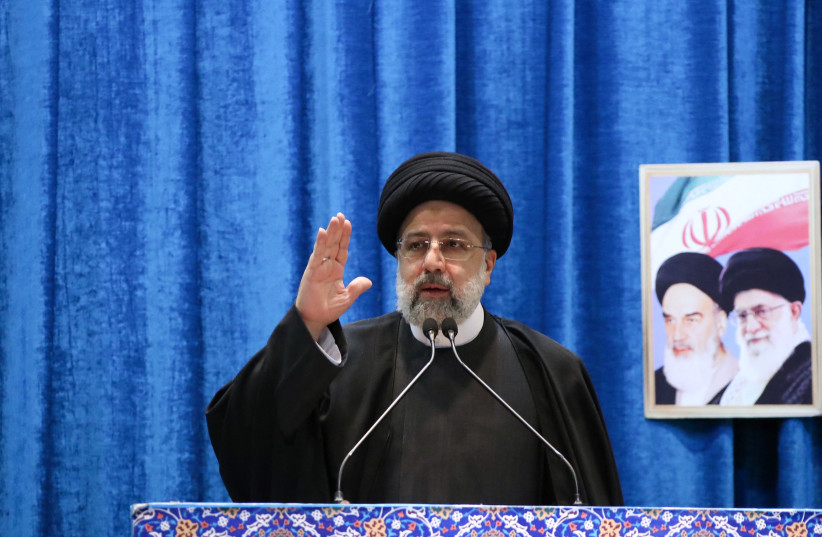 Iranian
President Ebrahim Raisi gestures as he speaks at Tehran's Friday prayer
on the occasion of the 43rd anniversary of the Islamic Revolution of
Iran in Tehran, Iran, February 11, 2022. (credit: PRESIDENT WEBSITE/WANA
(WEST ASIA NEWS AGENCY)/HANDOUT VIA REUTERS)
Iranian
President Ebrahim Raisi gestures as he speaks at Tehran's Friday prayer
on the occasion of the 43rd anniversary of the Islamic Revolution of
Iran in Tehran, Iran, February 11, 2022. (credit: PRESIDENT WEBSITE/WANA
(WEST ASIA NEWS AGENCY)/HANDOUT VIA REUTERS)

